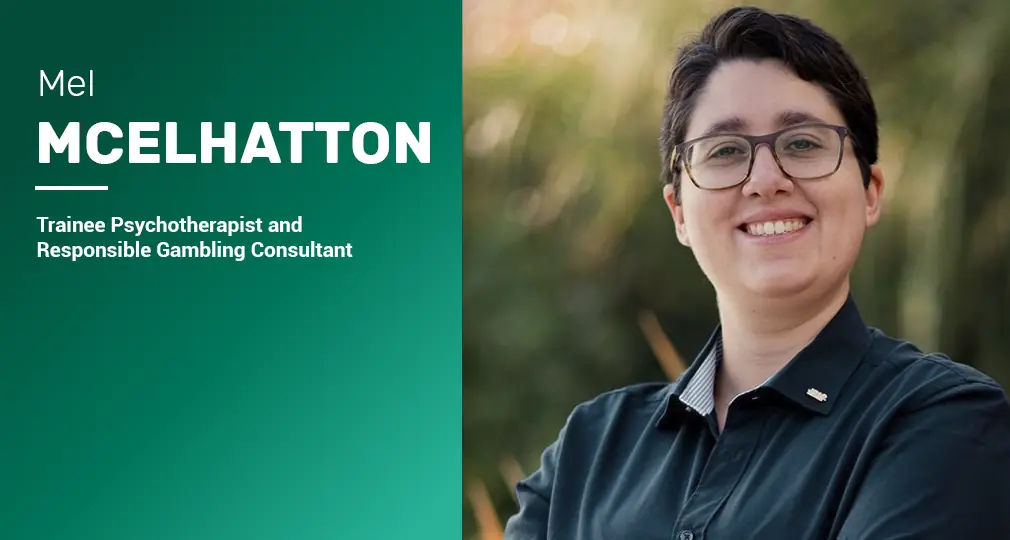The problem of gambling addiction is one of the key issues in many countries with both regulated and unregulated industries. While governments and even some operators try to tackle the problem of gambling addiction via limits and restrictions, its level remains high in some regions.
Mel McElhatton, Trainee Psychotherapist and Responsible Gambling Consultant, has explained gambling addiction from the psychological standpoint and named types of games, which are the riskiest.
Find more interviews and gambling news from various jurisdictions on the GBC Time.
What are the first signs of gambling disorder?
There are various signs, which indicate that someone is developing a gambling disorder. However, the first signs, which one can notice are: gambling more often and with higher amounts; not having enough money to pay for necessities such as rent, food, or to pay bills; and gambling in places and in times, which would be considered inappropriate, such as during working hours, missing out on meeting friends to gamble instead, or gambling during the late hours of the night.
What chemical processes in the brain are triggered when an individual gambles? Which neurotransmitter is the most associated with gambling?
Dopamine is a hormone that your central nervous system uses to communicate from one nerve cell to another. It is also known as a neurotransmitter because of this role. Further, your brain is the most important organ in the central nervous system. So we can say that dopamine is one of the chemicals, which sends messages from one cell to another in the central nervous system, which includes the brain. Dopamine is also known as the neurotransmitter which causes pleasure. When you enjoy something, it’s because there is the release of dopamine. However, when dopamine is released frequently due to a particular activity, the brain begins to become desensitised, meaning that it needs more and more of that activity for the same amount of dopamine to be released – in other words, this may start to develop into an addiction.
What types of gambling activity most frequently become the reason for gambling addiction?
A person can become addicted to any type of game, however, games, which require a low level of skill, and which give a “result” in a short period of time, such as slots, are considered to be risky. This is because even when losing, you are not given time to process this loss as the next bet is immediately possible.
On the other hand, for young people specifically, the risk of addiction is higher in those who bet on sports. The risk is higher due to the accessibility of the bets, and also the frequency of games which, one can bet on on a global level. Further, one may be more enticed to gamble on sports as it is easy to believe that you can guess the outcome of the matches, even though it is still a game of chance. And gamblers are enticed to gamble on matches with a higher payout, which are those matches that are harder to “guess” who is going to win or lose.
The rate of addicted gamblers who play online is higher than those who prefer land-based gambling. What is the reason for this? Does it mean that iGaming is more dangerous for vulnerable players than brick-and-mortar casinos?
Online gambling has quite a few risk factors for gamblers. First and foremost, it is accessible – one does not need to go to a physical casino to gamble, which means that the gambler can log in and out of the website or app as often as they want without fear of shame – unlike a land-based casino where one can be noticed how frequently they are going in and out and for how long. Apart from this, accessibility also means that the player can gamble at any point, anywhere, be it while waiting for the bus, or at work, or while waiting for a friend to arrive. Another risk factor about online gambling is anonymity. The person might feel safer behind a screen where no one knows who they are and how much they are gambling.
Are current gambling regulations in European countries aimed at responsible gambling really effective? What else should governments do to ensure a decrease in the number of problem gamblers?
Various countries in Europe have their own regulations, such as Malta, Italy, Spain and Sweden, with their own versions of responsible gambling regulations. What we are seeing is that the more prioritised responsible gambling is, the lower the rates of addiction are in the country. However, we are also finding that over-regulation can result in larger problems, such as gamblers seeking out black market operators to play with. Therefore, it’s about toying the delicate line between protection and over-protection of the players, whereby they are still given responsibility over their own gambling, such as through the setting of limits. My recommendation is for the implementation of more human contact between the customer service agents and the players, this means more chats, and phone calls, particularly when there is the suspicion of responsible gambling issues.
What restrictive tools work best for gambling addicts (self-exclusion systems, loss limits, etc.)?
Restrictive tools such as self-exclusion systems, and the setting of limits, allow the player to take greater control over their gambling. Therefore, there isn’t a way of answering which works best, however, they work best when they are provided together as options for the player to choose from. The more freedom the player has to control their own gambling, the more power we are giving the players to take back control over their own way of gambling.
Can gambling advertising stimulate individuals to start gambling? What triggers do marketing specialists use in gambling-related ads?
The aim of advertising is to entice someone to purchase, use, or do something, and the same applies to gambling advertising. There are various triggers, which are used in marketing material, generally, however, it makes gambling look like a fun way to spend time. The power of marketing cannot be denied, which is why various regulators have started to implement marketing and commercial communication regulations, which express that marketing material cannot make gambling seem like a way to earn money, or a way to combat loneliness, amongst other things.
Read more: Best Gambling Payment Providers














